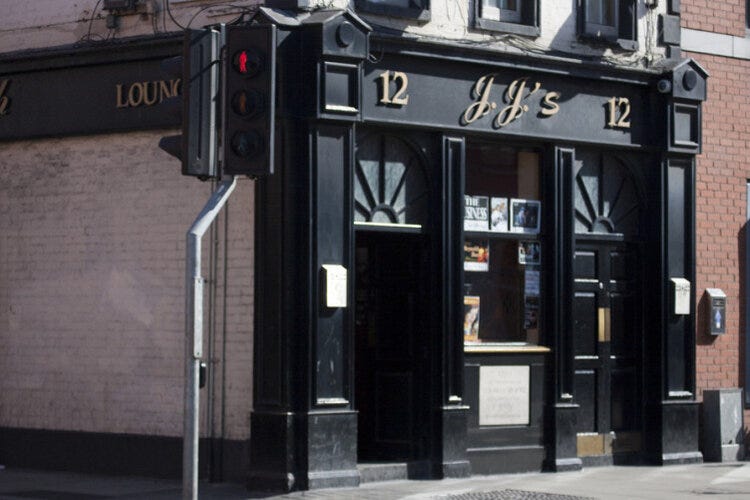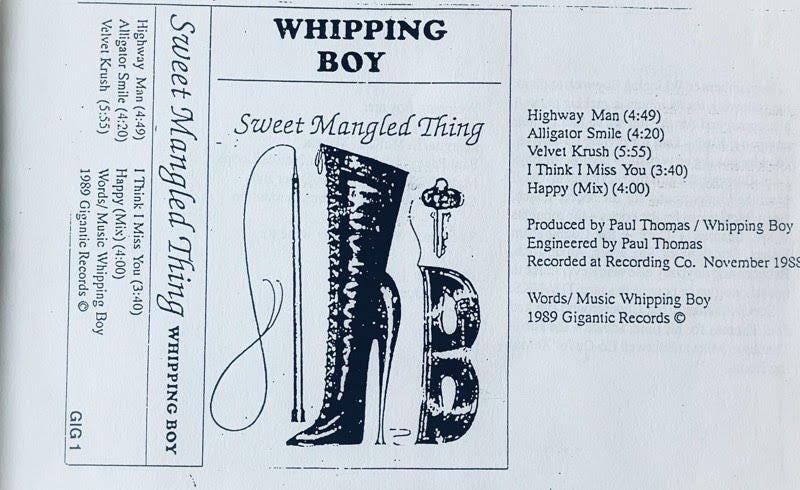Track 8: 'Or so the Senator said, one night in JJ Smyths where all the punks had played, and the Jazz men have their day...'
"The past is never where you think you left it.” - Katherine Anne Porter
Dublin is a city of ghosts.
On every street, there are reminders of past glories, triumphs and regrets. People and places long gone, that are part of our story, woven into the fabric of our lives for evermore.
It’s a grey November afternoon. A typical Winter’s day in the city.
I am walking along Aungier Street; I haven’t been in this neck of the woods in a long time. I knew it was no longer there, but it still comes as a bit of a shock. JJ Smyth’s is now the Thomas Moore Inn.
I stop for a brief moment to reminisce. Just fifty yards from here, we made our first recording in a small studio tucked away down a grubby laneway.
The Recording Company. It’s long gone of course, reconfigured, reshaped, a faceless office block now.
I recall the excitement of entering the studio for the first time.
It was November 1988. We had saved up enough money to book two days studio time. The studio was owned by a guy called Paul Thomas. Paul had worked as a sound engineer with the Virgin Prunes, Phil Lynott, Rory Gallagher. Most impressively, he had also been the engineer on U2’s debut album ‘Boy’ just a few years earlier.
We hit it off with Paul right from the start. He knew we were green, rough around the edges, but he got off on the spiky energy, the confidence we had in what we did.
We recorded and mixed five songs over the course of the two days. At times, Paul struggled at the console to bring a little order to the chaos. We wanted it loud, as noisy as possible -after initially trying to steer us towards playing a little quieter, he just ran with it and let us do our thing.
After the first day’s recording, we retired to JJ Smyth’s. We got an immediate sense he was interested in us. He saw something there, some spark. Over a few pints, we learned a little about him. After the U2 gig, there was an opportunity for Paul to go on and make some serious money working with some of the biggest bands in the world. It was there for him. But he rejected that route and set up a modest studio, working mainly with local bands.
He never really got into it, but there seemed to be a regret there, some sadness. I think he saw some of his peers take a different route to him, and go on to bigger and better things. He wanted to know our story. Who we were as people. By the time we got to day two of the recording, we felt there was a real bond there.
We emerged from the studio with our five song demo tape feeling like we had created something that was different to anything else on the Dublin music scene. We now had a calling card; the plan was to send it out to some independent labels in the UK, to use it to try and get a Dave Fanning radio session. The energy in the band around that time was incredible. This youthful zeal. To believe in something so wholeheartedly, so blindly is almost scary. But we had that belief in ourselves, a belief not matched by our skills as musicians at that time.
Every waking hour was devoted to the music, to our next move. I think it was Fearghal who first suggested we put the five songs out as a cassette EP. It was a case of why not? Looking back, I love the DIY spirit of that time, where you felt anything was possible. We had this music we thought was good enough to release -we didn’t have a record label so why not put it out ourselves? There was a low key buzz about the band at the time -very low key, but the live shows were generating a little interest.
It was all put together pretty quickly. We bought one hundred and fifty blank cassettes.
We photocopied the cover of a book called the Velvet Underground, a book about “aberrant” sexual behaviour from which the legendary band took their name. This would become the cover art for the cassette. We called it ‘Sweet Mangled Thing’. We named our temporary record label Gigantic records. The five songs were heavily influenced by Sonic Youth, the Birthday Party Big Black, the Velvet Underground, Blue Velvet, William S Burroughs, Charles Bukowski. Inspiration for us usually came in dark and unsettling shapes and colours.
In the early days, we liked the idea of being provocative, stirring things up a little. The bands that we loved had that edge to them, and we wanted to shake things up if we could. Onstage, Fearghal was becoming more confident, and with that came the freedom to shock and be more daring, more confrontational.
We approached the two main independent record shops in Dublin, Freebird and Comet Records and asked them would they stock the cassette on a sale or return basis. They each took a small quantity, and to our surprise, within a week, they had sold out and were looking for more.
We sent copies out to the press, the radio shows that we thought might give us some airtime. Dave Fanning played some tracks off the EP a couple of times - the thrill of hearing your music on the radio. It was something else. There was some sporadic mentions of the EP in the music press, and then through sheer luck, we pulled off what felt like a remarkable coup. Graham Linehan of Father Ted fame was a journalist with Hot Press at the time.
He had been down to see us at the Underground a couple of times, and liked what he heard.
Out of the blue, a review for ‘Sweet Mangled Thing’ by Graham appeared in the album pages of Hot Press, rubbing shoulders with the latest releases from the top bands and musicians at that time.
.
We couldn’t believe it. Very quickly, we sold out of the 150 cassettes. There was a slight bump in the crowds coming to the gigs.
The buzz grew a little louder.
Things were moving in the right direction. We went back into the studio prematurely with Paul Thomas, who had taken us under his wing, giving us free studio time, to record some more tracks. He was keen to help out, possibly with an eye to a quasi-management role down the line. To be honest, we weren’t really ready to record anything else; the songs we recorded were just half formed sketches, and most of them ended up discarded.
But there was one song from those sessions that turned out to have a direct link to ‘Heartworm’ many years later. We were in JJ Smyths one night after recording, and this elderly man, a local from the area sat down with us.
We got talking; he was an interesting character, known locally as ‘the Senator’ for reasons we never really explored. Just before we left, we asked could we record him speaking, and explained that we wanted to include it on a song. We gave him free license to say anything he wanted, anything at all, with the promise we would use it on the recording, unedited.
What he said, would eventually be included in the lyrics of ‘Personality’ on ‘Heartworm.
“The fantastic thing about the female
Is that she was put on this earth
To be admired and adorned, not abused..”
It was perfect. We included the audio snippet as the intro to a song called ‘Always Honey’, which is lost somewhere in the archives.
We don’t know what became of the Senator. We never saw him again. But his words stayed with us, and continued to echo until they found their way out into the world when ‘Heartworm’ was released.
Those ghosts again. Always there. Always with us.






